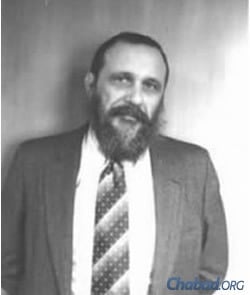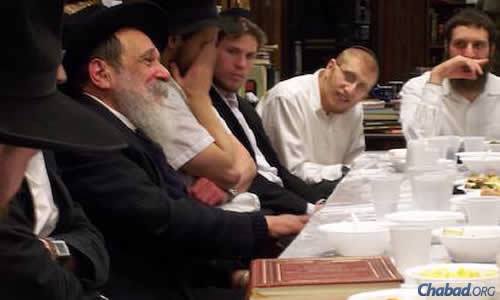Rabbi Zalman I. Posner, the profound and prolific translator and author of popular Chassidic works who served as a larger-than-life rabbi in Nashville, Tenn., for 53 years, passed away on April 23 at the age of 87. He was a pioneer of Jewish outreach on a national and international scale.
The eldest of six children, each of whom was active in Jewish education, Zalman Posner was born in British Mandate Palestine in 1927. His parents, Sholom and Chaya, had recently fled the oppression of the Soviet Union and made their home in Rishon Letzion, where Sholom eked out a living as a shochet (ritual slaughterer).
When the Previous Lubavitcher Rebbe, Rabbi Yosef Yitzchak Schneersohn, of righteous memory, visited the Holy Land in the summer of 1929, Sholom Posner hired another shochet to take his place and spent every waking moment at his beloved Rebbe’s side from morning to night. During the course of the visit, young Zalman fell ill, and his distraught mother asked the Rebbe to pray for her toddler. On the Rebbe’s last day in the Holy Land, he asked Sholom how his son was feeling. Sholom, who had not been home in days, had no idea what the Rebbe was referring to; seeing Sholom’s blank stare, the Rebbe broke into a broad smile.
At the Rebbe’s urging, the Posners immigrated to the United States, where Sholom took up a position as a shochet in Linden, N.J. When the Rebbe visited America in 1930, Chaya Posner brought Zalman and his younger brother Leibel to the Rebbe in New York for a blessing that they grow to be Torah-observant. The Rebbe placed his head in his hands, looked up at her and said that her sons would remain unscathed by the secular zeitgeist blowing through the American Jewish community.
When Zalman got a little older, Sholom and a local rabbi put together a parochial school for their children and a few others. It would eventually become a day school with an enrollment of hundreds. It was a harbinger of the schools that both Sholom and his son Zalman would yet found in Pittsburgh, Pa., and Nashville, Tenn., respectively.

When Zalman was 10, he and Leibel, 8, were sent to New York, where they attended Toras Emes and Torah Vodaath yeshivahs in Brooklyn.
In 1940, the Rebbe arrived in the United States on the heels of the Nazi invasion of Poland. Immediately, he established the Central Lubavitcher Yeshivah, an institution of Torah learning modeled after those he had led in various countries in Europe. Zalman Posner was one of its first students—with the distinction of also being the first “out-of-towner.”
The Rebbe took a personal interest in the Posners. Before departing home in 1941 to Chicago, where their parents lived at the time, the boys entered the Rebbe’s room to receive his parting wishes. “You are my children,” he told the two teenagers. “To your mother and father you are physical children, but you are my spiritual children.”
On the Scene in Nashville
In 1948, together with fellow student Mendel Baumgarten, Zalman Posner was dispatched to Europe to serve the needs of Holocaust survivors and refugees from Stalinist oppression living in displaced-persons camps in France, Austria, Germany and Holland.
In 1949, he was told by the sixth Rebbe about a rabbinic post at Congregation Sherith Israel in Nashville, Tenn, and was instructed by the Rebbe to apply for the position. Shortly thereafter, he married Risya Kazarnovsky, the daughter of a prominent Chabad activist—Rabbi Shlomo Aharon Kazarnovsky of Brooklyn.
The two of them made their home in Tennesee’s capital, where the bearded rabbi and his young wife were greeted by people who never expected them to stay more than a few months.

But stay they did. Almost immediately, they began inviting Vanderbilt University students to their home—creating a model that would become the basis for future Chabad on Campus centers all across the world.
One of his first protégés was young Yitzchok Block, who was studying Greek philosophy at Vanderbilt. “My father just gravitated to him,” recalls Block’s son, Rabbi Chaim Block, now a Chabad emissary in San Antonio, Tex. “In 1952, Rabbi Posner brought my father to the Rebbe [Rabbi Menachem M. Schneerson, of righteous memory] and served as the conduit that brought him to Torah Judaism and Chabad. When my father was offered a scholarship to pursue his Ph.D. at Harvard, he wanted to give it up in favor of full-time yeshivah studies. But the Rebbe would not hear of it, saying he would later regret the lost opportunity. Rabbi Posner supported and encouraged my father as he indeed went to Harvard.”
In 1954, the Posners founded Akiva day school with only five first- and second-grade pupils. At the time, Nashville’s Jewish community was by far the smallest in America to boast a Jewish day school, and the couple had a hard time convincing donors to support their new endeavor. Sixty years—and many hundreds of students—later, their vision proved auspicious.
From the 1960s to the 1980s, Rabbi Posner began traveling regularly to New York, where he was the featured speaker at the “Encounter with Chabad” weekends held in Brooklyn. With his signature wit and erudition, he not only entertained and educated his audience of curious college students and young adults, but taught an entire generation of Chabad rabbis the mastery of the pulpit by example.
His Friday night address was often followed by an informal discussion led by none other than Dr. Yitzchok Block, professor of philosophy at University of Western Ontario, in London, Ontario.
Rabbi Manis Friedman, a world-renowned author, lecturer and philosopher, recalls that he used to sneak out of yeshivah to attend every one of Posner’s talks. “Rabbi Posner’s ability to present Chassidic concepts in English was revolutionary” says Friedman, who is himself regarded as one of the foremost teachers of Chassidic thought. “No one thought it could make sense in English. You needed a specialized language to convey these thoughts. He showed that it could be done. It was like bringing Chassidism to this hemisphere for the first time.”
Friedman says the most important lessons he learned were to speak softly with confidence, to encourage questions and to never underestimate the intelligence of the audience—if anything, speaking slightly above their comfort zone.
”I recall one time when he spoke about the inner meaning of the mitzvah of tefillin, discussing many metaphysical ideas in a wonderful, lucid manner. When he finished speaking, he asked if there were any questions. There were none; everyone was just sitting with open mouths. Finally, one student asked, ‘Is this what you meditate about every morning?’ He responded, ‘Nah, I just put them on.’ That made an even bigger impression,” says Friedman.
As Friedman developed into a teacher and lecturer in his own right, he says he learned the tricks of the trade from Posner, adopting his comforting, friendly tone, informal style, and absolute faith in the truth of the Torah ideals he espoused. “There was one time when I was speaking and [Posner’s] sister was in attendance,” he notes with a touch of pride. “When I finished my talk, she told me, ‘I closed my eyes while you were speaking, and it was as if Zalman was in the room.’ ”
He traveled widely, often speaking in South Africa, Australia and the United Kingdom. As a leading member of the Rabbinical Council of America (the rabbinic arm of the Orthodox Union), and the Central Committee of Chabad Lubavitch Rabbis in the United States and Canada, he would often speak at organizational conventions and contribute to their publications.
Knows ‘Chassidic Thought’
Posner’s literary output was copious. In addition to regular articles (many of which are featured on Chabad.org), he translated many important Chassidic texts, including two sections of the Tanya, the primary guide to spiritual life written by Rabbi Schneur Zalman of Liadi, the first Lubavitcher Rebbe. Posner would often have long meetings with the Rebbe regarding the translations he was working on. The Rebbe once recommended him for a certain translation job, remarking that Posner “knows Chassidic thought.”

His first book, Reflections on the Sedra, was published in the 1950s and featured succinct thoughts on the weekly Torah portion. Rebbetzin Chana Schneerson, mother of the Rebbe, once told him that she made sure to study the weekly Torah portion using his commentary.
In response to the Rebbe’s urging, he wrote Think Jewish (1978), a collection of essays that presents Jewish teachings and wisdom in contemporary language that related to the thinking of modern American Jews. Much of it was based on his legendary talks for students at the “Encounters.”
As one of the earliest and best-known expositors of Chassidism and Judaism in contemporary language, he received prodigious amounts of mail. He would respond to these letters, pecking away with two fingers on his typewriter or dictating the responses as he paced back and forth.
In the 1980s, he and his wife traveled to the Soviet Union, where he performed clandestine weddings and taught Torah there.

Yet even as he traveled, Posner remained devoted to his community in Nashville, where he served as community rabbi for more than half-a-century, and principal and Judaic-studies teacher deep into his retirement years.
“I was looking through some school reports from the late ’80s,” says his daughter Vivi Deren, “and the comments he wrote about the students were just amazing. It was so interesting to see how he knew each child so well. Even while pointing out an area where they needed improvement, he would put it in a way that the child and the parents would feel good. He was a very engaging teacher, and everyone felt this.”
“For years, he would characteristically stand to the side in the group kinus picture (at the annual conference of Chabad-Lubavitch emissaries), holding on to the lamppost,” noted Mrs. Deren. “Someone pointed out: Yes, a lamplighter of the highest order, holding on to the lamp in the Rebbe’s daled amos.”
He is survived by his children: Vivi (Rabbi Yisrael) Deren, Mendel (Jeannie) Posner, Sussie (Rabbi Yonason) Denebeim, Miriam (Rabbi Mendel) Liberow and Rabbi Shimon H. (Chaya) Posner.
His siblings are Rabbi Leibel (Thirza) Posner, Rabbi Zushia (Yehudit) Posner, Bassie (Rabbi Gershon Mendel) Garelik and Sara Rivkah (Rabbi Avremel) Sasonkin, and his sisters-in-law, Mrs. Reba Sharfstein and Addy Kazarnovsky. His sister, Mrs. Keny Deren, passed away earlier this year.
Rabbi Posner was predeceased by his wife, Risya, in 2007.
Their descendants serve as Chabad emissaries all over the globe.
The funeral will take place on Friday morning, leaving Shomrei Hadas Chapels in the Boro Park section of Brooklyn, at 10 a.m.; passing by Chabad-Lubavitch World Headquarters at 770 Eastern Parkway in Crown Heights at about 10:45 a.m., with the procession expected to arrive at about 11:30 a.m. at the Old Montefiore Cemetery in Queens, N.Y.
Shiva will be observed at 1378 Union Street in Crown Heights. Condolences may be sent to [email protected].








Join the Discussion